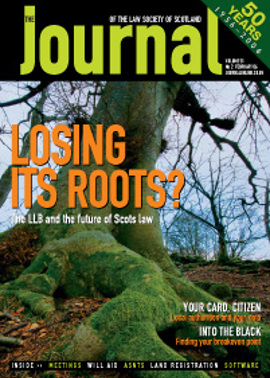A good case to read

There was a bit of a slip-up last time which should be clarified, I think: the reference to Sheriff Ruxton’s piece on causing death by careless driving and the reasons why this should perhaps not be a crime should have been a reference to a response to consultation by the Sheriffs’ Association on the invitation of the Home Office (the matter being a reserved UK one), largely drafted by Sheriff Ruxton. No apology is made for returning to the topic since it could be argued that the proposed change in the law argues a failure to understand the very nature of our criminal law.
When to disqualify
On a more bread-and-butter level, Edminson v Murray 2005 GWD 37-698 touches on the always difficult question of whether and when disqualification should be imposed for driving without insurance. The appeal court in this case substituted eight penalty points for six months’ disqualification. There were a number of things to be said in favour of the appellant (first offender, previously insured, inadvertent lapse) and these were taken into account, although the appeal court did also indicate that any sentence should reflect the length of time that the driver had for whatever reason been uninsured.
Still on disqualification, it used to be said as a rule of thumb that if a young person had to be disqualified then his or her case could not also be remitted to the children’s hearing. As children often do get into trouble over road traffic matters, the position was less than ideal and it has now been confirmed by the case of McCulloch v HMA 2006 GWD 35-706, a bill of suspension taken against the imposition of disqualification by the sheriff followed by a remit to the hearing for further disposal. The plain fact is that as matters stand, in terms of s 49(6) of the 1995 Act the court can either deal with or remit the case but not do a bit of both. The appeal court did however suggest that this is an area in which the legislature might like to act. The sooner the better, say we.
The wrong rider
McPherson v HMA 2005 GWD 35-709 is a somewhat unusual appeal against a judge’s charge, really on the basis of the jury being offered (and a majority accepting) an invitation to add a rider to their unanimous conviction to the effect that the victim had consented to being assaulted but that the accused had acted with evil intention to cause injury. As the appeal court pointed out, in the circumstances this meant that the jury could convict only if they were satisfied as to the complainer’s credibility but they could add a rider to the effect that they were not so satisfied. The result was held to be a miscarriage of justice and illustrates, one supposes, how careful judges must be not to do, or offer, anything manifestly self-contradictory.
Responding to Anderson appeals
The question of an appeal on the grounds of the conduct of one’s own defence comes up again in Kelly v HMA 2005 GWD 40-736, where an attempt was made to found on the alleged absence of certain actings by the defence agent as amounting to a breach of the appellant’s human rights. As it happened the appeal was not successful and the court restated what we might call the Anderson principle (1996 SLT 155), namely that it is only when a person’s defence has not been properly presented that it could be said that the right to a fair trial has been infringed.
The difficulty, of course, lies in applying the test, as it is always possible for an appellant to suggest that his or her defence might have been presented in a different way. What is important, however, is whether or not what was done was appropriate in the circumstances. It has always been feared that the existence of this ground of appeal lurking in the background might result in defences being put forward in a way that was not the most likely to succeed but was most likely to be appeal-proof, since no defence agent wants matters to end up acrimoniously with him or her being appealed by a client. It is true, as well, that it would be galling in the extreme for the Crown to see what seemed to them a perfectly good conviction overturned because of deficiencies not of their own making.
In this connection, one wonders what exactly might be the input of the prosecution and indeed of the presiding judge in the conduct of such an appeal. Certainly where in summary matters there is an appeal on the ground of inadequate representation it should be by way of bill of suspension on which the presiding judge would be able to comment. The defence agent whose conduct, alleged or otherwise, forms the subject of the appeal always becomes aware that he or she is under discussion since one of the documents upon which the appeal court will have to proceed is a report obtained from the trial lawyer saying what was done and why. One can of course see that this is necessary but there does seem something disquieting, at least where differences of approach are tactical rather than said to involve defined acts or omissions, about a course of action having to be justified ex post facto in the light of criticisms made by someone who was not there at the time.
Anecdotally, the last such matter of this nature with which the present writer had to deal was taken by way of stated case. As every schoolboy knows, sheriffs are not allowed to refuse to state cases, so the agent complained of certainly did not know what was going on, although the court did have the opportunity in the stated case of commenting on the conduct of the defence. (Perfectly all right, since you ask.) Whether the fact that the appeal had been raised in the wrong form would give rise to another round of appealing on the ground of defective representation is not known.
Failure to disclose
As it happens, in Kelly there was also an attempted attack on the conduct of the prosecution based on an alleged failure to provide full information about contentious matters. Here again the principle that the Crown should disclose anything likely to be of material assistance to the proper presentation of the accused’s defence was re-stated, but of course then came the problem. The appeal court had to decide what had or had not been disclosed and whether or not any such thing might have helped the defence. The situation is not, I think, a happy one, potentially involving as it does a great deal of work for very little result. But as matters stand it would be a good idea for all defence agents to read the case in full to see where they stand both as regards the Crown and the possibility of their ungrateful/disappointed/misguided clients taking their case elsewhere for further action.
Mixed statement directions
An old friend, the mixed statement, crops up again in the case of Sneddon v HMA 2006 GWD 1-7. The statement in question, broadly, implicated the accused but exculpated him from the use or knowledge of the involvement of weapons. While the appeal court agreed with the submission that the presiding judge had misdirected the jury as regards the correct approach to a mixed statement, it took the view that in the whole circumstances no miscarriage of justice had occurred. What the judge should have done, it was said, was to direct the jury that they should consider the whole statement, both in its potentially incriminatory parts and in its potentially exculpatory ones, and decide whether the statement or any part of it was true. However the surrounding circumstances were that counsel for the appellant had founded in his speech to the jury on the exculpatory parts of the statement, and had asked for them to be accepted and so to acquit the appellant of anything more than he had admitted to in the statement, and that the sheriff had commended the speeches of counsel without indicating that they should not consider the exculpatory parts. The jury had also been permitted to consider a transcript of the statement in the jury room. In the circumstances it was held that it was not realistic to suppose that the jury might have thought that they were not entitled to consider and if necessary give effect to the exculpatory parts of the statement and the appeal was refused.
Formula for success
As a footnote, the next case in GWD, Armstrong v HMA, deals with what happens when a trial judge departs from a tried and trusted formula. The matter was one of reasonable doubt, where 99 times out of 100, at a guess, judge, prosecutor and defence will all speak of a situation which would cause the jurors to hesitate before taking a decision in the conduct of their own lives, the hesitation and not the decision not to follow a certain course being the critical matter. Here however the judge spoke of an example of reasonable doubt being where “you still couldn’t make up your mind, you were still left in doubt about what to do”, Different words but the same meaning, said the appeal court, and the appeal failed.
In this issue
- Legal aid in children's hearing referrals
- Still waters run deep
- Catch-up or patch-up?
- Legal science or law-lite?
- Heads above water
- Your name on file
- A welcome addition
- Another ***** meeting?
- A neglected asset
- Planning a year of action
- The Pagan mission
- A good case to read
- Jurisdiction: dispelling the myth
- That special something
- The art of cashing in
- Scottish Solicitors' Discipline Tribunal
- Website reviews
- Book reviews
- In on the Act
- Keeper's corner






